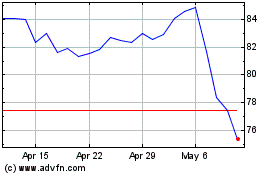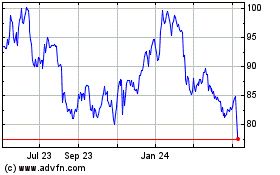TOKYO—Toshiba Corp. on Monday hung a "for sale" sign on its
health-care division, part of a broad move to get outside help for
a conglomerate that expects to lose $4.5 billion this year.
Toshiba has been racked this year by one of Japan's biggest
accounting scandals, which has morphed into a broader crisis
affecting nearly all its major units. Its shares plunged 10% Monday
and have lost more than half their value since March.
The company earlier said it was seeking investors for its
Westinghouse nuclear subsidiary and its semiconductor business, and
it is talking with Fujitsu Ltd. about a possible merger of
personal-computer units.
The company said Monday it would cut 6,800 jobs, or about 30% of
the total, in its consumer electronics and appliances unit, and a
further 1,000 jobs in its headquarters operations. While a few may
find other positions at Toshiba, most will leave the company,
Toshiba President Masashi Muromachi said.
Analysts said Toshiba needs to find buyers quickly to stem the
downward spiral and ensure its memory-chip business and other
hopeful areas aren't starved of capital. Otherwise, they said, the
company risks joining Sharp Corp., which has been bailed out twice
by its lenders in three years, on the list of Japanese electronics
firms struggling for survival.
"The biggest problem for Toshiba, in terms of making sure its
memory chips remain competitive, is its ugly balance sheet," said
Satoru Oyama, an analyst at IHS. "It should make sure it can raise
enough funds for further investment."
Confirming reports over the weekend about large losses, Toshiba
said it expected a net loss of ¥ 550 billion ($4.5 billion) in the
year ending March 2016. That includes ¥ 230 billion in
restructuring costs following the accounting scandal, in which the
company has acknowledged overstating profits by more than ¥ 150
billion over seven years.
Deepening problems in the company's consumer electronics
business are one reason for the losses, but tough market conditions
for the company's mainstay nuclear and semiconductor operations are
also playing a role. Toshiba said sales would fall by 7% this year
and projected an operating loss at its semiconductor unit, which
has been hit by a slowdown in China and weaker growth in global
smartphone sales.
"We admit our steps toward restructuring were behind the curve,"
Mr. Muromachi said at a news conference. "The damage wouldn't be
this large if we had been able to implement overhaul plans much
sooner."
Japan's sprawling electronics conglomerates have spent much of
the past two decades trying to rationalize their operations. The
rise of China particularly hit their consumer-electronics
businesses.
After the global economic crisis broke out in 2008, Hitachi
Ltd., Panasonic Corp., Mitsubishi Electric Corp., NEC Corp. and
Sony Corp. all cut back on consumer businesses to focus on more
profitable business-to-business sales. A deal symbolic of the shift
came Monday when Panasonic, which has long sold refrigerators to
consumers, said it would buy Hussmann Corp., a U.S. maker of
display cases and refrigeration systems for retailers, for $1.54
billion.
Toshiba took some steps to overhaul its consumer businesses,
unloading its mobile-phone unit, but analysts say it lagged behind
its rivals. The accounting irregularities made the problem worse by
concealing problems.
"What Toshiba can learn from other electronics companies is the
importance of quick decision-making," said Atsushi Osanai, an
associate professor at Waseda Business School in Tokyo. "Toshiba
should have done across-the-board restructuring years ago, but it's
not too late."
Mr. Muromachi, the president, said Monday the company would
"focus on businesses that can generate profits" and would "consider
withdrawals from unprofitable ones if a turnaround is
difficult."
Even the health-care unit, which Toshiba had described as a
pillar of growth, is now on the block. The company said the unit's
scale—it generates less than one-tenth of Toshiba total sales—was
inadequate, so it is seeking to sell a majority stake. Toshiba's
diagnostic scanners face stiff competition from the likes of
General Electric Co., Koninklijke Philips NV and Siemens AG, as
well as Samsung, which recently identified health-care as a growth
area.
Mr. Muromachi said Toshiba had received expressions of interest
for the health-care business. So far, deals have been hard to come
by, aside from a sale of Toshiba's image sensor operations to
Sony.
In the nuclear business, Toshiba's Westinghouse subsidiary has
struggled to win new orders for reactors since the Fukushima
Daiichi plant disaster in Japan in 2011.
Restructuring has been hampered by management turmoil. Toshiba's
president and his two predecessors left company posts over the
summer. Mr. Muromachi, who had been serving as chairman and stepped
in as president after the shake-up, is expected to step down next
June, according to people familiar with the situation.
"In order to compete against global giants such as General
Electric and Siemens, Toshiba should overhaul its management
quickly," said Hisashi Moriyama, an analyst at J.P. Morgan.
Write to Takashi Mochizuki at takashi.mochizuki@wsj.com and Eric
Pfanner at eric.pfanner@wsj.com
(END) Dow Jones Newswires
December 21, 2015 07:35 ET (12:35 GMT)
Copyright (c) 2015 Dow Jones & Company, Inc.
Sony (NYSE:SONY)
Historical Stock Chart
From Mar 2024 to Apr 2024

Sony (NYSE:SONY)
Historical Stock Chart
From Apr 2023 to Apr 2024
